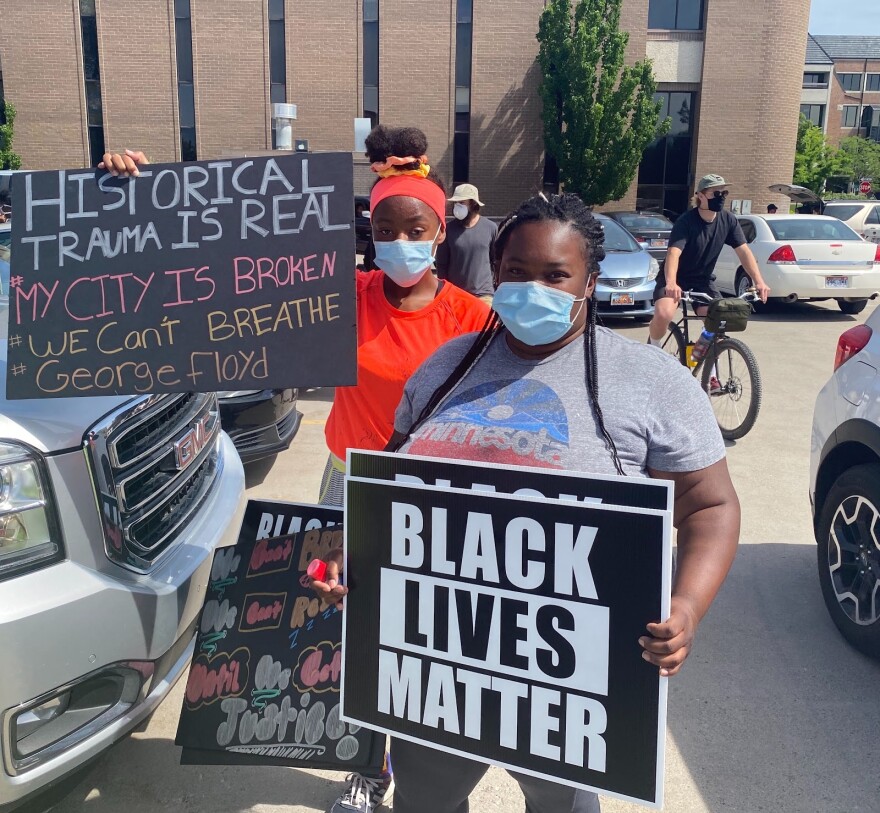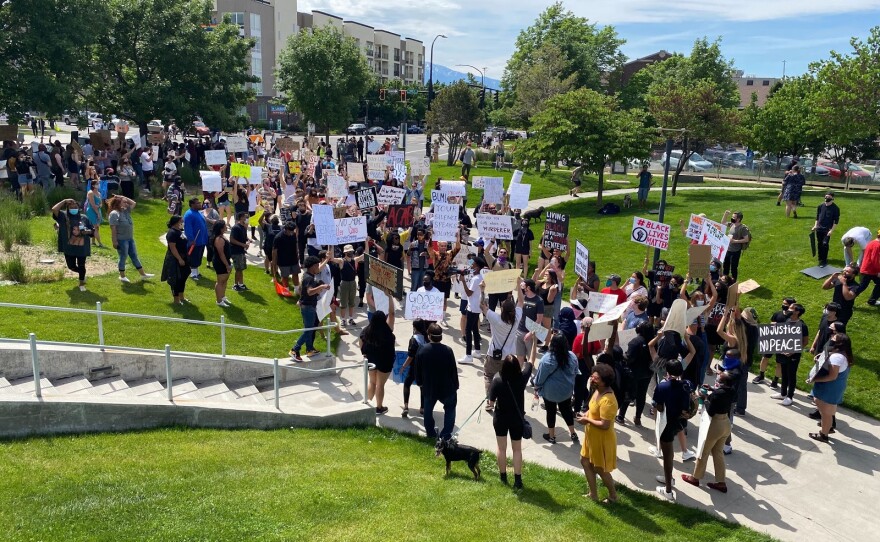Chants of “Justice for George Floyd” and “No justice, No peace” filled the hot Salt Lake City air Saturday morning, as more than a thousand protesters — some on foot, others in cars — marched against police brutality.
Temperatures hovered in the lower 90s but that did little to prevent people from joining the movement. Originally billed as a car caravan around the Salt Lake City Police Department building, the event turned into something much larger. People marched from Denver Street to police headquarters before arriving at the Utah State Capitol.
Protests started off peaceful from the morning into early afternoon. Later in the day, Salt Lake City police retweeted photos of an overturned squad car that had been set on fire and asked people to stay away from downtown due to “civil unrest.”
Organizing The Protest
Carly Haldeman, with the group Utah Against Police Brutality, helped organize the event. She said the recent police killings of George Floyd in Minneapolis and Breonna Taylor in Louisville inspired the protest. But Salt Lake City has its issues too.
“We have a local killer-cop problem,” Haldeman said. “They just shot Bernardo Palacios last Saturday. We think this was a murder and we demand all justice for police crime victims in Utah.”
The manner of death in the three instances was different, but what was consistent among the cases was people of color were killed by police.
On May 25, A Minneapolis police officer held his knee on Floyd’s neck for more than eight minutes as he was handcuffed and lying face down. In early March, Police in Louisville forcibly entered Taylor’s apartment to serve a search warrant and shot her eight times. And Palacio died from police gunfire in Salt Lake City last weekend after officers responded to a call of a man making a threat with a gun.
Marchers Weigh In On Recent Events

As the march kicked off, Alicia Moreira’s passion was evident. She took the initial role of leading hundreds of protesters in chants. “Black lives matter! End police brutality! No justice, No peace!” she yelled, almost losing her voice, as they moved down Salt Lake City streets.
“We’re just saying that my life matters, my skin matters, my hair matters,” Moreira, who is studying criminal justice and is from West Africa, said gesturing to her the afro she was sporting.
Moreira said she was fueled by the history of the black experience in the country, from slavery to the image she saw on social media throughout the week.
“This country was built on the backbone of black Americans,” she said. “We gave [white America] hundreds of years to fix this.”
But, she said, nothing has changed and that scares her.
“We’re in the middle of a pandemic,” she said, referring to the coronavirus which has disproportionately affected the African-American community. “And you’re telling me going outside is a trap. I have a brother. I have a dad. If they come out tomorrow will they be dead?”
Salt Lake City Mayor Erin Mendenhall weighed in on Twitter as the protest continued. In an attempt to assuage concerns, she said in an open letter that the police department “does not allow the use of technique to head or neck as a form of restraint.”
Mendenhall also highlighted policies of accountability and training that the officers go through. She said the department is being proactive and has asked community leaders from Utah’s Black Lives Matter chapter and Utah Against Police Brutality to review and give their input on the department’s training and policies on use of force and restraining techniques.
The Last Straw?

Also among the protesters was Maliah-Mae Pennington, who is from Minneapolis but happened to be camping in Utah for the past week. Then she started seeing the video and images of Floyd’s death and the subsequent violent protests.
“We felt kind of lost knowing we couldn’t support back home because we were so far away,” Pennington said. “So we jumped on the chance to be able to support our city from so far away.”
But she warned this isn’t an isolated incident that only Minnesotans have to deal with. Floyd’s death was just the latest event of police brutality.
“What happened in Minneapolis isn’t the first time,” she said. “It’s happened many times and no one has been brought to trial. We just got fed up with it and no one started taking us seriously until buildings started burning.”
In 2016, Philando Castile was shot and killed by a police officer in the city of St. Anthony, northeast of Minneapolis. The officer was acquitted of charges of manslaughter and reckless discharge of a firearm.
The accumulation of events that spurred Saturday’s protest also took a toll on native Utahns like Candace Collins.
“Police are supposed to be serving us and protecting us,” Collins said as she fought back tears. “And they’re killing us and that’s not fine. And they need to know we’re sick of it. It’s been happening too long.”
As a teacher, she said she also talks to her students so they know what’s going on and don’t perpetuate racial bias.
Speaking Up For Floyd

That’s the same lesson Kris Ricard, of Lehi, said he tries to pass down to his kids. He has two boys, 7 and 4. His lesson to them is understanding their privilege and making sure they learn that everyone doesn’t have that.
“Not everybody gets to go to sleep every night and not worry about what might happen to them the next day,” Ricard said.
For Ricard, showing up Saturday was what he and others need to do until there is meaningful change, he said.
“I’m here to speak for George Floyd because I get to go home tonight,” he said. “I get to hug my kids tonight. I get to wake up tomorrow. He doesn’t. And the only reason that was him and not me, is because of the color of our skin. And if I don’t speak out against that oppression, who will?”








